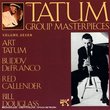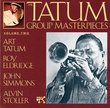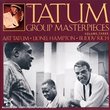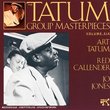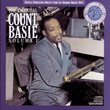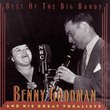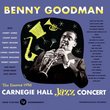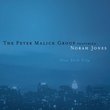| All Artists: Art Tatum, Ben Webster Title: The Tatum Group Masterpieces, Vol. 8 Members Wishing: 0 Total Copies: 0 Label: Pablo Release Date: 7/1/1991 Genres: Jazz, Pop Styles: Swing Jazz, Traditional Jazz & Ragtime Number of Discs: 1 SwapaCD Credits: 1 UPC: 025218043120 |
Search - Art Tatum, Ben Webster :: The Tatum Group Masterpieces, Vol. 8
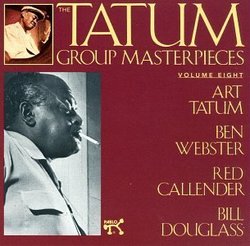 | Art Tatum, Ben Webster The Tatum Group Masterpieces, Vol. 8 Genres: Jazz, Pop
Japanese limited edition issue of the album classic in a deluxe, miniaturized LP sleeve replica of the original vinyl album artwork. |
Larger Image |
CD DetailsSynopsis
Album Description Japanese limited edition issue of the album classic in a deluxe, miniaturized LP sleeve replica of the original vinyl album artwork. Similar CDsSimilarly Requested CDs
|
CD ReviewsBrian's Song ltravail | alexandria, va | 08/05/2010 (5 out of 5 stars) "I have to admit I got a real kick out of the review posted by one "Brian" some years ago on these pages (it's a classic). I am a huge Art Tatum fan...or more aptly, I am one of those who worship at the temple of this man's rare genius - along with scores of others infinitely more knowledgeable of musical artistry than me. Still, the sentiment (rage, passion, or a bit of both) expressed in the "Brian" review (and by other critics during and after Tatum's lifetime) are not entirely invalid. I have found myself listening to him sometimes (and I listen to him almost daily, sort of like praying I guess) wanting to just cry out "please Art, give me some ease, man...have mercy and let me breathe for a second"! Listening to him over an extended period, at times, reminds me of my college days slogging through those 18th/19th century German philosophers (e.g., Hegel, Kant and such) whose thought-threads would run 2 or 3 pages without a single "period" along the entire trail. The experience could be likened to water-boarding I suppose - too much water and not enough air. Then one of his masterpiece tracks comes on ("Tiger Rag", "Humoresque", "I Know That You Know", "Tea for Two", "Love For Sale", "All The Things You Are", etc.), and suddenly, what on a previous track may have seemed a merciless torrent of gravel being slung-shot at your face becomes a panorama of lightning bugs on a hot summer night mystifying you with the interplay of their alternating bio-luminescent exchanges from every plane and cranny of the darkness. At those moments, the constant runs and arpeggios fit beautifully within the ingenious structures that spring from his brilliant musical mind. The "ornaments" are no longer just a dizzying procession of pebble-like notes being flung at you, but are themselves as self-contained and indivisible as any other musical unit (a pitch, a beat, etc.) in the peice. Tatum always said there was reason and logic to every note and run he ever played (though he never explained it, that I'm aware of, always preferring to let the piano do his talking). As much as I idolize this great artist, I can't always find the rationale for some of those "ornamental" insertions myself (though I did see a book on Amazon, which I intend to purchase, that purports to provide an expose of the reasoning process in Tatum's work). But what mortal would have had the nerve to tell this giant to his face that he plays too many notes (much less tell him they're gonna lop off his fingers if he doesn't cut down on the runs, as "Brian" once threatened). Some say that, being a black man born in the heyday of America's "jim crow" insanity, he went to great lengths to prove to "white" America that a black man could indeed achieve the standard of mastery defined and held dear by the cultural "thought-leaders" of his chosen field of endeavor. If, in Tatum's mind, there was an inkling of truth to that "stick-it-to-the-man" compulsion, well, it wouldn't be hard to be sympathetic, even if one thinks sometimes it may have been counter-productive. Still, here was a man who transcended every possible social inferiority America could tag onto one of its own native sons (black, blind, poor) to prove that such a human being not only could attain the highest level of artistic achievement, but set a new standard of accomplishment in the musical arts in the process (not to mention having a scientific unit of measure, the "tatum", named after him). I certainly will grant that "getting with" Art Tatum can be difficult, especially if one's relationship to music is casual or relegated to commodified radio pop formulae. He is dense, he is demanding, he is uncompromising, and you cannot obtain an appreciation for what sets him apart from mere mortals in a passing glance. Music - like physics, like art, like literature - is an intellectual endeavor (at least "serious" music, i.e., jazz and classical). It is a system of knowledge, of logic and reasoning. The demands for achieving a mastery, a virtuosity, of that system of knowledge are as strenuous as in any other (depending on how far one chooses to go). A careful listening to Tatum's music, first off, reveals a man of prodigious learning, a master of musical knowledge every bit the equal of the most celebrated classically-trained musicians of his day (many of whom were in awe of his abilities). But what separated him from mortals was his gift of dexterity and imagination to deploy the elements of his vast learning into structures not heard before - neither in classical nor jazz - and in a way that was and still is far beyond the execution capabilities of all but the most rigorously trained and skillful pianists. Without question, the man is fully deserving of the reverence in which he is held by nearly every practitioner of the art form and his smattering of fans in the layman's world. If the man had lived long enough to reach that resurrection period (the 70s mostly) that memorialized the careers of the jazz greats of old (such as Ellington and Basie) he'd be on a USPS postage stamp at the very least. Indeed, there are other artists from whom I derive a certain kind of pure pleasure I do not get from Tatum (Bud Powell, Oscar Peterson, Horowtiz, for instance). But I listen to Tatum for enlightenment, for fascination. He is like taking a course in quantum mechanics - so far above your head yet so exoticly mesmerizing that you'll be drowned before you even realize you've just gotten wet. I fully understand where the "Brian" types are coming from. So there is no need to shame someone for not showing proper deference to OUR "god", even if it means they'll burn in hell for all eternity on account of their infidelity (ummmm...LOL)." Titans Thomas Plotkin | West Hartford CT, United States | 11/12/2008 (5 out of 5 stars) "This record has a deep personal signifigance to me, words don't quite do justice, so I'll be atypically brief. Art Tatum was the most formidable virtuoso pianist in the history of jazz. So ornate was his style, he steamrolled other players (who were scared to death of him anyway) and he played best alone. Ben Webster may not have been "the Best" tenor saxophonist ever, but his absolutely personal, immediately identifiable sound made him the Best Loved; a brawling, tempestuous, mercurial man, his tone was breathy, cello-like, ardent, the voice of the ideal manly lover who could coax anyone into bed. He started out as a swashbuckler (see Cottontail, with Duke), but as he aged, he stuck to slight variations on ballad melodies, the grain of his voice, the sound of air pushed through the horn, providing a thrill that surpassed any amount of variation. Put the flashy, baroque fireworks of Tatum and the breathy simplicity of Webster together on a program of largely standard ballads and what do you get? It's simple. These two go together like Astaire and Rodgers, and if hearing this doesn't sweep you off your feet into some heavenly ballroom of bliss, then you're not breathing. The most erotic jazz album ever recorded." All The Things Ben Is...... ABH457 | New York | 04/13/2009 (5 out of 5 stars) "Peter Jones above takes the words, or at least the idea, out of my mouth, or in this case, fingers!! I don't wish to detract in any way from the other superlative items on this CD, but I have loved the Tatum-Webster first take of "All The Things You Are" for almost five decades now. (Note: The second take is on "The Album"). The reason it is special for me is that I first heard it on an LP compilation from the Group Masterpieces around 1960 and, of all the items on it, this one and the Trio Blues with Jo Jones stood out. I have used it to show modern jazz fans and players how a jazz musician not only needs his own tone and sound, but he also needs phrasing that sets up a story and builds it logically. In "All The Things You Are" Webster uses the tune's classic chord changes and harmonies along with his broad breathy tone to tell someone he clearly has in mind.......that he loves them. There is probably no more selfless and genuine expression of love in jazz than this. "Night and Day" is the only swinger, but the entire CD is one that will last with you forever. And as you tire of endless hardbop flurries of notes that passes for jazz today, and get to the point where too many begin to sound the same, put on "All The Things You Are." Just as we have gone wrong in finance and economics, so we have started down a none too fruitful path in jazz. Ben and Art will put you back on the main highway where musical brilliance does not obsure the message."
|

 Track Listings (10) - Disc #1
Track Listings (10) - Disc #1